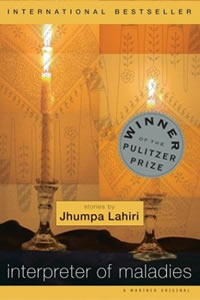This meteorological shift has inspired within me a desire to get back into that old hobby of mine called "reading." I have enough time on my hands these days, God knows, and R.A. is always coming home from the bookstore/ library/ rummage sale with new books in her clutches, and so I often end up picking up the books that she has just finished, many times after she gets too frustrated trying to talk to me about something that I haven't yet read.
Therefore, without (much) further ado, and to kinda coincide with my summer movie list, I present a partial list of books that I have either read, am reading, or will read this summer:
Interpreter of Maladies by Jhumpa Lahiri.

This is one of those aforementioned books that I read after R.A. finished it in order for us to be able to talk about it. We have seen the movie "The Namesake," based on Lahiri's novel, although I haven't read that book (yet). Interpreter of Maladies is a collection of short stories that Lahiri wrote for her M.A. thesis at Boston University and then went on to win the Pulitzer Prize in 2000. Most of the stories revolve around the lives of immigrant Indian families in the U.S., or around the tensions between generations of Indian-Americans. I really, really liked this book. I especially liked how each of these stories seemed to be a reiteration of the same story over and over again, with slight modifications in the characters and settings. It gave the book a sense of being both a complete and whole piece, while also existing in time as a work in progress. It actually made me think a little bit of Italo Calvino's Invisible Cities, although I think I prefer Interpreter of Maladies because it deals with real people and not with crazy, surrealist Italian hallucinations.
Short Stories by Nikolay Gogol

Speaking of crazy, surrealist hallucinations...
So I'm reading Gogol for a couple of reasons. The first was because Lahiri's protagonist in "The Namesake" is named "Gogol," and I thought that knowing more about the Russian writer would give me some additional insight into the story. So far, it hasn't. However, the second reason is that I wanted to resurrect my tradition of reading Russian lit during the summer. From 2004-2007, I read a Dostoyevsky novel each summer (The Brothers Karamazov, Crime and Punishment, The Idiot, Demons.) And then, last year, because I suck, I stopped. I tried replacing Dostoyevsky with Henry James, but it too me, like, eight months to finish The Golden Bowl, and besides, stories that so often take place in London sitting rooms while everyone drinks tea and has long soliloquies about the rain outside ought to be read between January and April. On the other hand, I feel like stories about opium induced madness and suicide and about your nose leaving your body and usurping your identity are best read during the dog days of summer, as they will help with the night sweats and fever dreams.*
Wicked, by Gregory Maguire

OK, so I am probably the last person in the world to have read this book. And, even though I'm only about a quarter of the way through it, it is pretty awesome. My favorite thing about Wicked is the political intrigue; I have always been in awe of authors, especially fantasy and sci-fi authors, who can create a society that has believable and realistic political issues. On one level, Wicked makes me laugh at the absurdity of the class conflict between the Munchkinlanders and the Gillikinese and the constant debating over whether or not to expand the Yellow Brick Road. But then they become real, important issues that I care about very deeply. I think that the epitome of this kind of construction of a real and yet imaginary politics is Frank Herbert's Dune, although that series becomes so wrapped up in the theology and metaphysics of its universe that it loses sight of what makes it initially intriguing to the reader, those issues that apply categorically to all people of every class, creed, and ideology.
By which I mean fighting over water rights.
*Help in the sense of making them weirder and more terrifying.
No comments:
Post a Comment